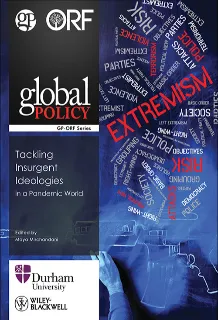Editors Note
When the impact of COVID-19 will be analysed historically, the ability of the pandemic to exacerbate existing political, socio-cultural, religious and ideological faultlines will undoubtedly find prominence. If 2019 saw governments and tech-companies commit to working towards the elimination of terrorist and violent extremist content online by signing on to the Christchurch Call to Action, 2020 has seen a ‘viral’ explosion of weaponised information that has not only deepened polarising divides but also underscored the challenges of keeping up with the speed, volume and ever-changing nature of technology and how it is being used in these unprecedented times.
The Christchurch Call was premised on the fundamental belief of the need for a free, open and secure internet, and the right to and respect for freedom of expression. However, the fine balance between safeguarding these freedoms and ensuring that technology does not become a tool in the hands of bad actors—state or non-state—using platforms in a pandemic to promote hate and violence is being severely tested. Deepfakes using heavy- duty artificial intelligence and computational manipulation and cheap fakes that doctor existing video have snaked through cyberspace to impact perceptions of public health and humanitarian crises, about the reach of Big Pharma and Big Data, to create conspiracies, and to threaten and target already marginalised communities.
Extremists are taking advantage of such an infodemic characterised by several forms of weaponised information. Intentionally false narratives or ‘disinformation’, inadvertently false ‘misinformation’, an intentional lack of fair and balanced reporting or ‘missing’ information, and ‘mal-information’ that can lead to cyberattacks that amplify religious or racial polarisation have been unleashed globally in a climate already vitiated by radical, ideological violence. Our contributors make the case that ‘ideological formations and online subcultures’ are building extremist cohesion amongst disparate individuals and inspiring acts of violence offline. Instead of group affiliation, the need of the day is to understand the advent of extremist ‘ecosystems’.
In the West, particularly the US, which is currently in the throes of a vicious election campaign, COVID-19 has become political. Not only has it only worsened a geopolitical and geo-economic conflict between the US and China, it is feeding conspiracies about the supposed enemy—immigrants, atheists, Muslims, ‘rogue’ nations and the like. So much so that our American contributors argue that their country’s biggest threat today is not only transnational jihadist violence from groups like ISIS and al-Qaeda, but by what the FBI is prioritising as domestic terrorism—white supremacist groups fueled by these divides. If the US wants to pursue countering violent extremism (CVE) strategies, can the current White House have a consistent message against all forms of extremist violence, jihadist and otherwise?
But it is not just the US. Across the world, whether it is in Turkey (where the centuries old Hagia Sofia has been declared a mosque instead of a museum, pitting Muslims against each other as moderate or radical), or Hungary (where Viktor Orban has used the pandemic to decree his permanent presidency and enforce authoritarian control over a democratic country), or in India (where the COVID-19 lockdown on the back of violent communal riots in Delhi that targeted Muslims for their vocal opposition to new citizenship laws, found members of a conservative, proselytising Muslim sect at the receiving end of accusations of having spread what several right-wingers termed #coronajihad), the intersections between populist politics, ideology, dangerous speech and real world harm have become all too apparent. Our contributors make the case that a new post pandemic threat landscape is fluid, and global extremist movements have become fractured franchises, adding to the breadth of the challenge.
As political discourse turns tribal, reductive and binary, it not only challenges law enforcement and national security agencies in terms of the new threats it creates, but also in terms of the drivers of radicalisation that need addressing. Our contributors argue that this “lethal combination of political, institutional, legal, economic and social exclusion promises to sow the seeds for a conflict that will destabilise India in the years to come.”
While defining a global CVE agenda, the United Nations has repeatedly emphasised the need for a comprehensive approach to tackling the spread of terrorism and violent extremism, and asked member states to promote inclusion and cohesion within their borders, to engage with relevant local communities, and to address conditions that abet the spread of violent extremism by empowering youth, their families, and cultural, social or religious organisations. The hope that law enforcement, researchers, practitioners and the media could not only ensure security, but also become agents of positive change is, however, premised on the building of trust. Trust among these various institutions and individuals, and between those vulnerable to radicalisation. And yet, in an atmosphere of hate and intolerance, amplified by a pandemic that has brought out our basest survival instincts, it seems we are back at the beginning.
As several of our contributors ask—can we define and identify a process of radicalisation? Can we identify drivers of radicalisation beyond the obvious markers of ethnic, racial or faith-based identities? Can we find ways to address the concerns of individual, community or national security, while ensuring a free and democratised internet, without the government’s interference and the attendant dangers of its surveillance of political dissent? And perhaps most importantly, can we do it urgently, to mitigate the damage already done by the cauldron of radical violence, ideological hate and populist polarisation that threatens our futures as seriously as a pandemic does today.
The views expressed above belong to the author(s). ORF research and analyses now available on Telegram! Click here to access our curated content — blogs, longforms and interviews.

 PDF Download
PDF Download



 PREV
PREV


